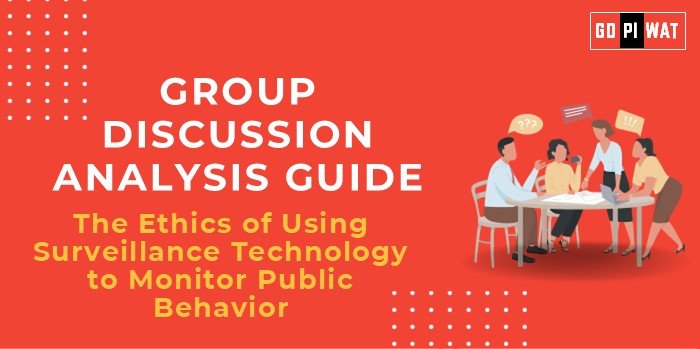📋 Group Discussion (GD) Analysis Guide: The Ethics of Using Surveillance Technology to Monitor Public Behavior
🌐 Introduction to the Topic
Opening Context: Surveillance technology is increasingly deployed to monitor public spaces, aiming to enhance safety, reduce crime, and improve public services. However, these advancements spark ethical debates about privacy, consent, and the balance between public good and individual freedoms.
Topic Background: The use of surveillance technology, from CCTV cameras to AI-driven analytics, has grown exponentially, with governments and corporations leveraging it to track behaviors. This raises questions about data misuse, ethical boundaries, and long-term societal impacts.
📊 Quick Facts and Key Statistics
- 📈 Global Surveillance Market Size: Expected to reach $100 billion by 2025, reflecting rapid adoption across sectors.
- 📷 CCTV Density: London leads globally with over 600,000 cameras, about one per 13 residents.
- 🧬 Facial Recognition Accuracy: Modern systems achieve up to 99% accuracy but are prone to racial and gender biases.
- 🔓 Data Breaches: Over 80% of organizations using surveillance report concerns about unauthorized data access.
- 📋 Public Support for Surveillance: 65% of people in a global survey support its use in crime prevention but oppose unwarranted personal monitoring.
🤝 Stakeholders and Their Roles
- 🏛️ Governments: Use surveillance for law enforcement, public safety, and urban planning.
- 💻 Private Companies: Develop and market surveillance tools, often controlling critical data.
- 👥 Citizens: Both beneficiaries and subjects, often without informed consent.
- 📣 NGOs and Advocacy Groups: Raise awareness about privacy, ethical concerns, and data rights.
- 🌐 International Organizations: Develop guidelines and regulations (e.g., EU’s GDPR).
🏆 Achievements and Challenges
✨ Achievements
- 🔒 Crime Reduction: Studies show a 20% decrease in crime in areas with high surveillance coverage.
- 🏙️ Urban Planning: Smart cities optimize resources using behavioral data.
- 😷 Pandemic Management: AI surveillance monitored mask compliance and social distancing during COVID-19.
⚠️ Challenges
- 🕵️♀️ Privacy Invasion: High-profile cases of misuse, such as the Cambridge Analytica scandal.
- 📊 Bias in AI Systems: Studies reveal errors in identifying minorities, raising concerns about fairness.
- 🔐 Data Security Risks: Frequent breaches undermine public trust.
🌍 Global Comparisons
China: Pioneered AI-driven mass surveillance but faces global criticism for lack of privacy safeguards.
European Union: Stricter laws like GDPR prioritize citizen consent and transparency.
📚 Case Studies
India’s Aarogya Setu: Balancing health tracking with privacy during the pandemic.
UK’s Surveillance Tribunal: Examined ethical breaches in covert public monitoring.
📄 Structured Arguments for Discussion
- ✅ Supporting Stance: “Surveillance technology improves public safety and enables efficient resource allocation, crucial for modern urban governance.”
- ❌ Opposing Stance: “Surveillance systems erode privacy and disproportionately target marginalized communities, raising ethical red flags.”
- ⚖️ Balanced Perspective: “While surveillance technology has undeniable benefits, ethical deployment requires transparency, accountability, and citizen consent.”
🎯 Effective Discussion Approaches
- Opening Approaches:
- 📊 “With over 600,000 CCTV cameras, London demonstrates how surveillance can deter crime but at the cost of personal privacy.”
- ⚖️ “Surveillance helps reduce urban crime, yet studies reveal AI bias against minorities, highlighting ethical dilemmas.”
- Counter-Argument Handling:
- ✅ Recognize limitations (e.g., bias) and propose solutions like algorithmic transparency and stricter data laws.
📊 Strategic Analysis of Strengths and Weaknesses
- 💪 Strengths: Crime prevention, urban efficiency, pandemic control.
- 📉 Weaknesses: Privacy invasion, biases, cybersecurity threats.
- 🚀 Opportunities: Ethical AI, public trust through transparency, global collaborations.
- ⚡ Threats: Public backlash, legal challenges, misuse by authoritarian regimes.
📈 Connecting with B-School Applications
- 🌐 Real-World Applications: Ethical governance in business, tech-based security models, or urban innovation projects.
- 🗣️ Sample Interview Questions:
- 💬 “How should businesses balance surveillance and customer privacy?”
- ⚖️ “Discuss the ethical considerations of using AI in public spaces.”
- 🎓 Insights for Students:
- Emphasize case-based learning and policy framing to navigate such dilemmas in corporate or civic leadership roles.


